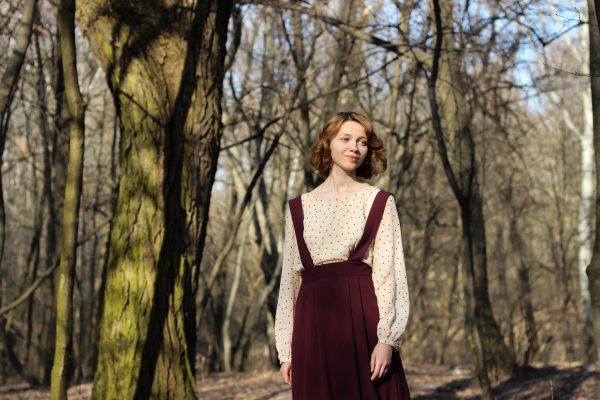
Anastasiia Tkachuk
Eastern Europe and Russian Studies student
First of all, how did you choose to study here at IIRPS VU? How did you find out about IIRPS VU and how did you choose the master‘s programme you‘re in?
To be honest, I had no particular reason to choose IIRPS VU or my study program. As many (ehm, almost all of the) decisions in my life to enroll into Eastern European and Russian studies was based on an impulse rather than on research and rational evaluation. At the time I was having a gap year between my Bachelor and my Master’s and had no idea what to do with my life besides somehow contributing to social development and generally something good. Sounds a bit preachy, but that is how it was. I had the idea to join UNESCO and searched for programmes in social sciences field. And somehow it came to my mind to type in Google Search “Vilnius university” and the rest is history.
What is your main area of interest?
My prior area of interest is social development. In my perspective, it is a broad term and includes a lot of concepts from technological progress to LGBTQ+ rights movement. The world is in a miserable state regarding the global warming crisis that will hit us all soon if everyone does not stop valuing profit over the planet. Thus, my main interest for now is the question of how to actually ensure better social development and how can one contribute to it.
How did you come across your interest in UNESCO? Why are you interested in working there?
UNESCO for me represents the values that I have elaborated on earlier. Particularly, I do believe that increasing the level of education, and turning it to a basic human right instead of social class privilege is a crucial part of enhancing social development. Hence, UNESCO’S educational programs (especially those that concern girls’ and women’s education) is something that I would love to join someday.
Recently you organized a YABC session at IIRPS VU. Can you tell us more about the concept and how it went? How did you get interested in this?
YABC (Youth as Agents of Behavioral Change) program is established by International Federation of Red Cross and Red Crescent Societies and is aimed at recognizing destructive social patterns and changing them through a process of self-reflection. The session of YABC program consists of two parts: game and discussion. During the specially designed game participants show particular behavioral patterns. Afterwards, the discussion and evaluation of behavior takes place. The topics vary from active listening to gender inequality. Therefore, I got interested in it while being a volunteer at Red Cross in Ukraine and took training to become a YABC trainer myself since the program is aimed to raise personal and social awareness about a lot of issues concerning creating a better, kinder society. The session in Vilnius University was dedicated to personal resilience. We had only four participants, but still it was quite productive and overall people were satisfied. I hope that in future YABC sessions here would have more participants to discuss some more difficult topics as non-violent communication, discrimination or cultural dialogue.
How do you find your experience here in Lithuania, in Vilnius? Did you have any expectations before coming here? Is the university culture any different from National University of Kyiv-Mohyla Academy?
To be honest, I expected to see more differences in everyday life. Maybe because partially I was brought up with an idea that the EU countries have some dramatically different standards of living from Ukraine. Or maybe, I come from the post-soviet capital city as well and I have seen so much similarities that I almost felt at home in two weeks if not considering the language barrier. Now it seems to me that this is a very “cozy” country, if I may say so. However, in terms of university, this might be the biggest difference so far. The Kyiv-Mohyla Academy is very known to be proud of its students’ community, but in reality, it looks like it is being arrogant about the university’s prestige within the country much more than having a united community with diverse culture. I had some amazing professors at my university but the whole system always felt disproportionate. In contrast, I have experienced predominantly friendly and accepting attitude from classmates and lecturers here at IIRPS VU. Of course, nowhere is perfect and I had no illusions about a “superior European education”. Still, the experience here is definitely positive and meaningful in many ways.







